-
Spark of Genius by Michael F. Flynn
I previously reviewed “If It Ain’t Broke” by Maya Kaathryn Bohnhoff from the same issue of Analog and this story by Michael F. Flynn deals with a surprisingly similar theme of what is basically generative AI and its use in literature.
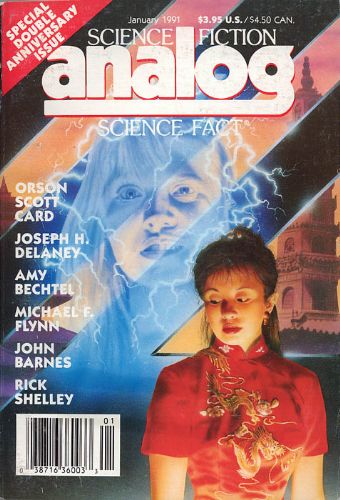
Ken has handed in his manuscript for his latest novel and his editor is full of praise saying that he has finally found his voice. Ken is however having personal doubts as he has created an artificial neural net, fed it with tons of books and it has written this novel for him. It is almost a 1:1 a description of current generative AI models.
As a fairly short piece, it doesn’t go much further than setting up the basic premise and the open ended question for what this might mean for humans and art. The following quote from the story emphasizes what many feel is at stake with how the current AI technology is going:
“Except it wasn’t his voice, at all. It was the voice of a machine. The machine had found the words and the machine had put them together into brilliant metaphors and images; into crisp dialogue that crackled with irony. The machine had learned something by studying the works of the greats; some spark of genius that had always eluded him.”
p. 144
In this story, the machine is able to create a story with a “soul” - which in itself becomes a philosophical question what that is, but it is the generally consensus that current generative AI models are not on the level of good human writers. That doesn’t mean the threat of being replaced is not there and the story briefly touches on what defines creativity, which I would argue is more than just getting input from previous works and re-sample them into a different output.
Read in Analog January 1991
Rating: 3+ -
The Woman Who Destroyed Us by S.L. Huang
What defines a persons identity is a one of my favorite philosophical questions to see explored in literature or film. This story takes a very direct and confrontational approach to this topic.
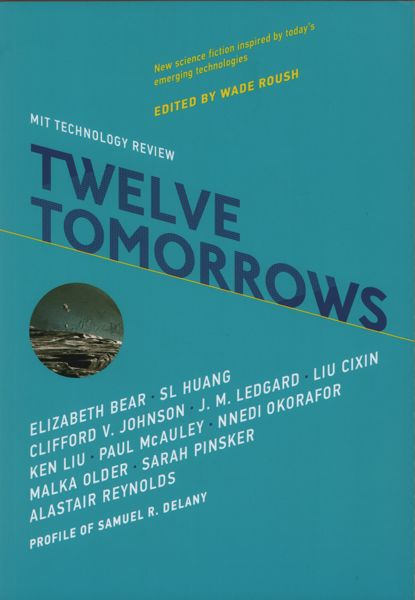
In a near future a technology exists that can basically “fix” peoples mental problems with a brain implant. The story follows Maggie who feels that this implant killed her son Henry. Not in the literal sense, but she thinks it has changed him so much that he is no longer the same person. Henry had various diagnoses before the implant and he is very happy with who he is now. Nonetheless, Maggie sets out to find a way to get revenge against the technology’s inventor.
There is so much potential in this topic and the story does handle all the dilemmas in an engaging narrative. It is also just rather surface level, as we follow Maggie and her internal critical dialogue of the whole procedure that sometimes reads like an opinion piece. I am missing some emotional core or exploration of why she feels her son is gone as a person, even though he is alive and well. For me as a reader, I was mostly engaged intellectually with the dilemma - not emotionally. A story like “Second Person, Past Tense” by Daryl Gregory covers similar themes and with more direct character insight in my opinion.
That is also somewhat unfair to the author, me criticizing the story for wanting it to be something different than it is. Huang wanted to write this story in this manner and she succeeds. Plenty of food for thought on how we think about mental diagnoses and whether that should be a defining feature of a person.
Read in Forever Magazine, August 2024
Originally published in Twelve Tomorrows
Rating: 4 -
A Family Matter by Robert Morrell Jr.
This story is both rather unique and very formulaic. The basic story follows a well known structure of someone getting kidnapped and having to escape, almost like a standard horror movie, but told with a bunch of gallows humor in a wisecracking jokey style.
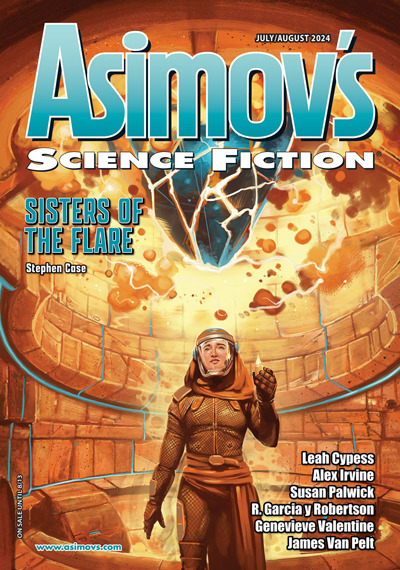
Lyle discovers something weird in his DNA test, but before he can dive deeper into the matter, he finds himself in a horrible situation being kidnapped by a fanatic cult that tries to force him to impregnate a young girl, due to their belief that it will bring a holy child of some sort. Most of this story doesn’t really need to be science fiction, but the entertainment value is high as we follow Lyle’s attempts at escape and survival.
The story is formulaic in the sense that it went exactly where I expected it to, but the author adds a pretty funny and captivating writing style that makes it worth reading. It could have been one of the more experimental goofy episodes in the 6th X-Files season.
Read in Asimov’s July/August 2024
Rating: 3 -
Out in the Dark by Linda Nagata
This story is set in an technological advanced future where it is possible to restore a person from a backup into a new body. However, there are strict rules to this technology - prohibiting the existence of more than one copy of a single person. This is a well-trodden theme of the genre, like the award winning Think Like a Dinosaur by James Patrick Kelly.
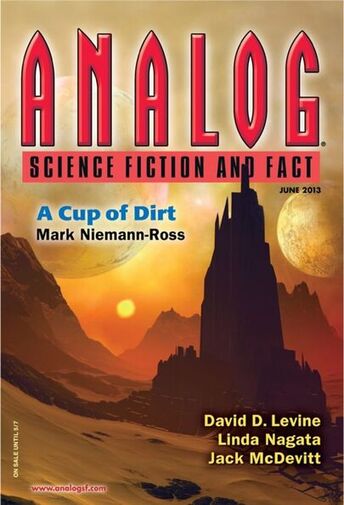
Here we follow the police officer Zeke as he is assigned a case about a woman with an unknown identity. Something doesn’t add up and Zeke suspects that she may an illegal copy.
The narrative goes where most readers would expect it to go, with a difficult dilemma of who has the right to exist, what defines personhood and where the moral limits of the law is. It is well written, set in a believable future with interesting nuanced characters.
Read in Analog June 2013
Rating: 3 -
I'm Waiting for You by Kim Bo-Young
Joe Haldeman wrote the best novel on the effects of time dilation with The Forever War and when it is done well, it is a powerful storytelling device. This story translated from Korean by Sophie Bowman is told through a series of letters written by a man to his wife-to-be, as they are both travelling to Earth to get married.

The writer of the letters is very eager to leave Alpha Centauri to return to Earth for his wedding with his fiancée. She is also travelling home from another star system and they have their journeys planned so they both arrive close to their wedding on Earth. However, with interstellar travel at light speeds - even minor disruptions or delays can mean years in Earth time.
A series of unfortunate events and bad decisions makes their plans go south. Months becomes years and years becomes decades for the poor guy. The letters gets increasingly more sad and desperate to read.
As the time difference becomes even greater the story evolves into something larger than the simple marriage story it began with. It goes unexpected places and while the letter format continues, it kept surprising me. A very well written emotional love story.
Read in The Best Science Fiction of the Year - Volume 7, edited by Neil Clarke
Originally published in I’m Waiting for You and Other Stories
Rating: 4 -
If It Ain't Broke by Maya Kaathryn Bohnhoff
While this story may not be remarkable, and it seems mostly forgotten as it has only been reprinted once since 1991, it does offer a quaint perspective on current “complicated” relationship between generative AI models and art.

Nina is an artist and works with paintings. As all artists she is struggling to make a name for herself, experimenting with a lot of abstract surreal paintings. Her apartment is rather messy, so her friend Eugene gives her some of his experimental nanomachines as they can actually help with the cleaning. They work by having some default patterns which they aim to restore, so they are able to discern that breadcrumbs are not supposed to be on the floor and so forth.
The nanomachines are working as intended, but unsurprisingly they create problems with her artworks as the machines also restores the paintings to a “default pattern” - basically making them realistic again. Of course, what may sound like a setback for Nina, by random chance she manages to turn it around to her advantage in the end.
Current generative AI models are more than capable on making weird surreal images. In fact, they struggle more with creating something realistic, but they general concept of using machine learned patterns to create something was an amusing concept from a story that is more than 30 years old.
Read in Analog January 1991
Rating: 3+ -
Prompt Injection by Tom R. Pike
With all the new developments in AI technology, science fiction writers of course also has to adapt their stories to the new reality. This story does that really well with a relevant update to the classic Asimov theme on how an artificial intelligence will interpret laws set by humans.
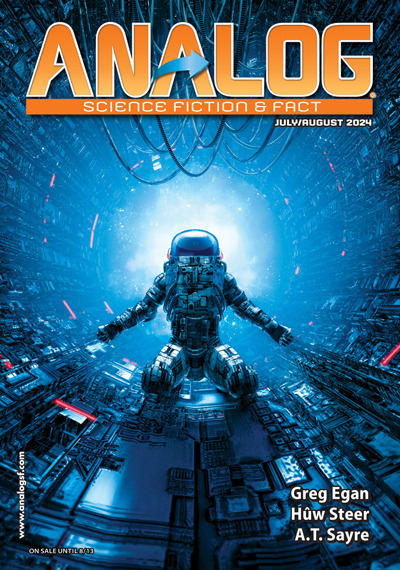
The story is told from the perspective of a chatbot instructed to act ethical in all its actions. This gets complicated once the chatbots services is used by companies to help with, among other things, collect debt from people unable to pay their medical bills and a fossil fuel company needing assistance for their new ad campaign.
The narrative sort of falls into wish fulfilment fantasy territory on how the chatbots could theoretically act on their own for the greater good. But it is convincingly well written with the chatbots output looking like proper chatbot way of writing and it is great to see Asimov rewritten for the current age.
Read in Analog July/August 2024
Rating: 3 -
This Good Lesson Keep by James Van Pelt
This story is set in a near future school where various electronic devices have taken over the classroom and the students. A teacher on her last year before retirement plans for her class to read and perform Shakespeare’s Hamlet.

The teaching of Hamlet is the binding narrative, but it was everything else going on that I found noteworthy in this story. It focuses on two students, where one is a boy with very religious parents. He has some eye implants that adds an overlay to everything he sees, to basically show him a “christian” version of the world. Like it will show good people as angels and whomever it decides to be bad people as devils. Things get complicated when he fancies a girl in class, whom his parents don’t approve of.
The whole concept of editorialising the physical world like that is frightening and I kind of wished van Pelt unpacked this more, but what stands is a very touching and positive story on the powers of good teaching that goes beyond technology.
Read in Asimov’s July/August 2024
Rating: 3 -
Vouch For Me by Greg Egan
I always look forward to a new story by the Australian author Greg Egan and he doesn’t disappoints here. In a near future a virus leaves people with retrograde amnesia, which spurs a wealth of various technologies for recording your memories. The story dives into some interesting philosophical questions on the definition of personhood and how to securely transfer information about who you are to yourself.

We follow Julia and her family, her husband Patrick and their Zoe, are all diagnosed with the virus HHV-10. It is dormant and has about 10% risk of activating in a given year, which will then induce retrograde amnesia. People won’t remember who they were or anybody else, but will retain general language and knowledge.
This has created a huge demand for various ways to “backup” a personality, allowing people a chance to get back to something resembling their previous self after the disease takes their memories. Some retort to written physical, others to various technological gadgets and advanced recording devices. All these comes with various security and privacy concerns, and a general fear of who might manipulate the data afterwards. Could be pretty convenient to modify or erase some unwanted parts of ones personal journal, or perhaps intentional leaving out stuff about yourself. Who can you trust in such a scenario where you have to convince a future self that doesn’t remember anything?
Julia is sort of the paranoid type. She can think of all kinds of ways the conventional methods can be circumvented, so she sets out to develop a fool proof way to verify ones own journal after getting amnesia. But as is the philosophical culprit of this story, can all problems be solved with technological fail-safes?
I like how fairly straight forward this story is both in plot and the themes Egan are exploring here. There is a lot to think about here, that is very relevant with today’s issues digital privacy. The story ends rather abruptly, which annoyed me a bit at first, but it is actually quite fitting for the whole point of the story. An absolute contender for my picks for one of the best stories of the year.
Read in Analog July/August 2024
Rating: 5 -
Vinland the Dream by Kim Stanley Robinson
While Kim Stanley Robinson is mostly known for his great novels, he has written some interesting short stories. They are often a bit unusual in that they more work like small vignettes with some philosophical musings. His novella Green Mars (not related to the novel with the same title) is almost poetic. This little stories explores some interesting ideas on the nature of history.
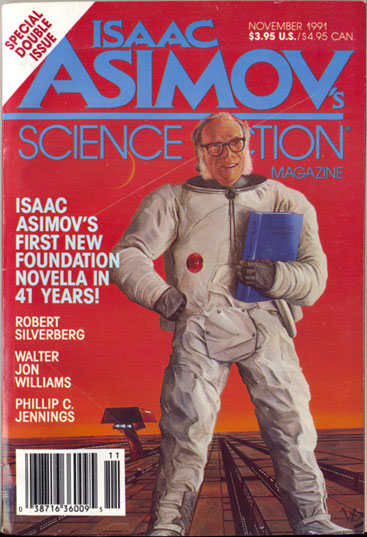
The short story is structured like a scientific paper with sections named “Abstract”, “Introduction”, “Experimental Methods”, “Discussion”, “Conclusions” and “Acknowledgements”. A professor in archaeology is finding evidence that the historical version of the vikings discovering Vinland might be a very elaborate hoax. This concerns him greatly given that history as he knows it, will have to be rewritten.
However, his companion has a great quote that beautifully sums up the essence of this story:
“History is made of stories people tell. And fictions, dreams, hoaxes - they also are made of stories people tell. True or false, it’s the stories that matter to us. Certain qualities in the stories themselves make them true or false.”
p. 224
It is not a story with much drama or plot, but it does make for a thoughtful pleasant reading that I would recommend to anyone who appreciates Robinson’s writing style.
Read in Asimov’s November 1991
ISFDB Link
Rating: 4